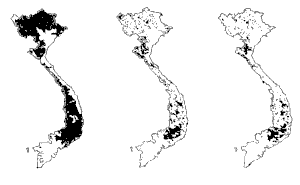 Impact on Vietnam
Impact on Vietnam Impact on Vietnam
Impact on VietnamBiodiversity, vital for human survival, is at risk from climate change. Any reduction of a species could cause ecosystem degradation and subsequent difficulties in the ability of local populations to preserve a quality of life.
This problem is of great significance to a developing country such as Vietnam because of its limited technical and financial resources. Survival in the present day and for future generations largely depends on the manner in which natural resources, especially biological resources, are exploited.
Vietnam possesses a diversity of biological resources, many of which are species endemic to Southeast Asia. These rich resources have been indispensable to Vietnamese stability and development. However, many of these resources are now being depleted.
Forest and wetland areas are being rapidly reduced and 355 plant species and 365 animal species are now under threat. Vietnamese ecosystems, such as the tropical forest, are both diverse and fragile and will easily deteriorate with irregular climate fluctuations.
For humanity, it is relatively easy to change habitat when the environment alters but many animal and plant species cannot respond so readily. Many species may be on the verge of extinction because they will not have enough time to adapt to a swift change in climate.
Resistance to climate change in species which have a small population appears to be very low. Inventories made by the World Conservation Union indicate that, world-wide, the number of endangered species extends to thousands. In Vietnam, it is around six hundred. Biological species extinction and biodiversity degradation are irreversible losses to humanity.
Global warming and climate change also favour the development of pests and viruses, especially viruses that cause disease to humans, domestic animals and crops in tropical regions.
Sea level rise will have substantial consequences for biological diversity.
Vietnam embraces around 3,000 km of coastline and there are large areas where the altitude is only one metre above or below mean sea level, for example, within the Red River Delta and the Mekong Delta. More than half of the country's population converges in these two areas. Vietnam's vulnerable topography also includes small coastal islands and many large coral reefs.
 Forest loss over the period 1943-1982.
Forest loss over the period 1943-1982.
A rise in sea level would inundate wetlands and lowlands, erode shorelines, exacerbate coastal flooding, increase the salinity of estuaries and aquifers and otherwise impair water quality, alter tidal ranges in rivers and bays and alter the locations where rivers deposit sediment.
Intertidal zones may be modified radically and ecosystems such as the mangrove forest could disappear. The physical and morphological characteristics of shallow waters might change considerably, impairing the functioning of these ecological systems. The complete loss of resources such as bird life, fish spawning and nursery grounds and shellfish production is possible.
Extending over 200,000 hectares, the mangrove forests of Vietnam provide a rich habitat for many species. The supply of marine products such as shrimp, crab and fish contributes substantially to the livelihoods of local communities. Mangrove forests take between 100 and 1,000 years to form and mature. Any significant rise in sea level would be to the detriment of all that live in or rely on this ecosystem.
Climate change and sea level rise will also threaten lagoons, the spawning places of sea turtles. Coral reefs too are expected to suffer from climate change and sea level rise.
Like many other developing countries, Vietnam relies extensively on its natural resources. Losses in biological resources caused by climate change and sea level rise will pose many difficulties in future socio- economic development.
Based on material provided by
Professor Vo Quy, Director, Centre for Natural Resources Management and Environmental Studies, Hanoi University
 "Impact on Vietnam: Agriculture"
"Impact on Vietnam: Agriculture" Index
Index